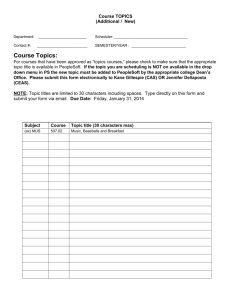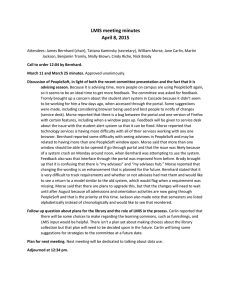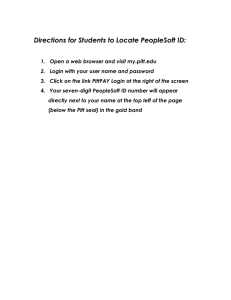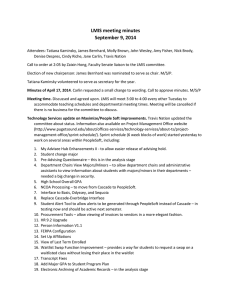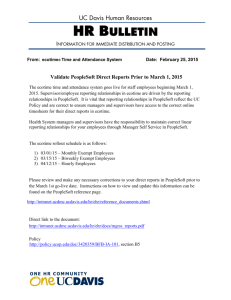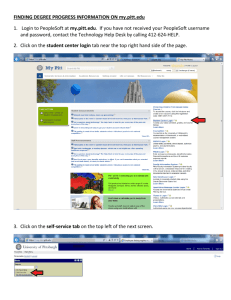LMIS meeting minutes March 11, 2015
advertisement
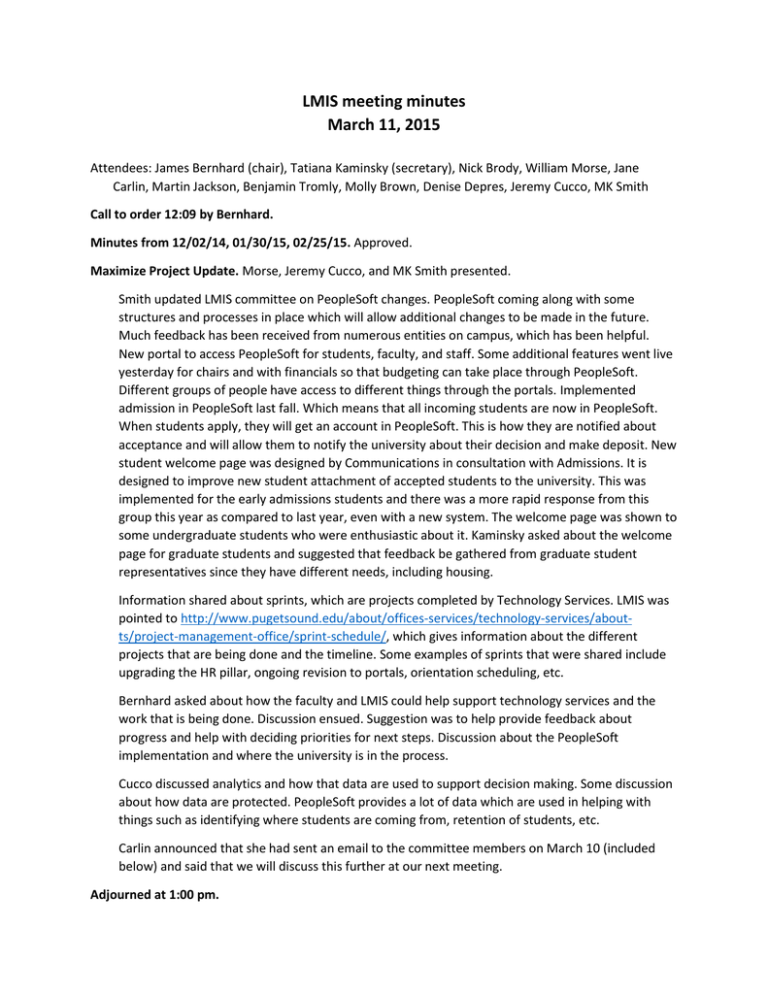
LMIS meeting minutes March 11, 2015 Attendees: James Bernhard (chair), Tatiana Kaminsky (secretary), Nick Brody, William Morse, Jane Carlin, Martin Jackson, Benjamin Tromly, Molly Brown, Denise Depres, Jeremy Cucco, MK Smith Call to order 12:09 by Bernhard. Minutes from 12/02/14, 01/30/15, 02/25/15. Approved. Maximize Project Update. Morse, Jeremy Cucco, and MK Smith presented. Smith updated LMIS committee on PeopleSoft changes. PeopleSoft coming along with some structures and processes in place which will allow additional changes to be made in the future. Much feedback has been received from numerous entities on campus, which has been helpful. New portal to access PeopleSoft for students, faculty, and staff. Some additional features went live yesterday for chairs and with financials so that budgeting can take place through PeopleSoft. Different groups of people have access to different things through the portals. Implemented admission in PeopleSoft last fall. Which means that all incoming students are now in PeopleSoft. When students apply, they will get an account in PeopleSoft. This is how they are notified about acceptance and will allow them to notify the university about their decision and make deposit. New student welcome page was designed by Communications in consultation with Admissions. It is designed to improve new student attachment of accepted students to the university. This was implemented for the early admissions students and there was a more rapid response from this group this year as compared to last year, even with a new system. The welcome page was shown to some undergraduate students who were enthusiastic about it. Kaminsky asked about the welcome page for graduate students and suggested that feedback be gathered from graduate student representatives since they have different needs, including housing. Information shared about sprints, which are projects completed by Technology Services. LMIS was pointed to http://www.pugetsound.edu/about/offices-services/technology-services/aboutts/project-management-office/sprint-schedule/, which gives information about the different projects that are being done and the timeline. Some examples of sprints that were shared include upgrading the HR pillar, ongoing revision to portals, orientation scheduling, etc. Bernhard asked about how the faculty and LMIS could help support technology services and the work that is being done. Discussion ensued. Suggestion was to help provide feedback about progress and help with deciding priorities for next steps. Discussion about the PeopleSoft implementation and where the university is in the process. Cucco discussed analytics and how that data are used to support decision making. Some discussion about how data are protected. PeopleSoft provides a lot of data which are used in helping with things such as identifying where students are coming from, retention of students, etc. Carlin announced that she had sent an email to the committee members on March 10 (included below) and said that we will discuss this further at our next meeting. Adjourned at 1:00 pm. Email from Carlin: “For many years the Library has been designated as a partial selective depository for US & Washington state government documents. As a member of the program we were obligated to follow depository library regulations which included bibliographic control, physical facilities, staff and service. The Library received certain documents on a standing basis and we were responsible for cataloging them and providing accessibility to the community at large. Over time, the government has reduced their publishing program while at the same made more materials available online. We have made a decision to leave the depository program which will allow the opportunity to realign staff responsibilities, reduce cataloging costs, potentially reduce the physical collection, while at the same time make better use of electronic resources. We intend to work with individual departments to review their needs and to identify materials that they consider important to retain. We will work with departments to assure that the materials needed for study are easy to access either electronically or in print. In addition, many of the documents are accessible from other libraries, such as Tacoma Public Library, our state funded universities and the Washington State Library, and if unavailable online, available through inter-library loan. Our goal is not to reduce support to the academic departments. Liaison librarians are reaching out to departments to discuss the current status of documents in subject areas and to ascertain if there are portions of the collection that have historical value that are not available electronically. This is similar in our approach to moving from print journals to electronic access. If specific documents and reports are required, we can still acquire them for the permanent collection or direct faculty to a government site. This will save money, allow us to reallocate staff time to new work as well as free up a significant amount of space.”
